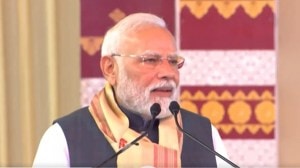Alone again
That Environment Minister Jairam Rameshs decision to put the introduction of Bt brinjal on hold overlooked the dominant scientific opinion on the subject is now well understood.
That Environment Minister Jairam Rameshs decision to put the introduction of Bt brinjal on hold overlooked the dominant scientific opinion on the subject is now well understood. This point was hammered home when both a current and former director of the Council for Scientific and Industrial Research spoke of how the decision failed to take into account some basic scientific facts such as that,if the Bt gene were problematic,it would already have affected Indians through widespread exposure to imported soya. But what has become very clear over the last couple of days is that it was,also,well outside the mainstream of political opinion. On Friday,Human Resources Development Minister Kapil Sibal told
The Indian Express: Some matters are best left to the scientific community to resolve. The government must trust the scientists on their decisions.
Agriculture Minister Sharad Pawar has in the past as well as quite recently spoken of his support for Bt brinjal. He has,indeed,come out in favour of the speedy testing and introduction of genetically modified crops. And,on Sunday,Science and Technology Minister Prithviraj Chavan spoke out as well about the processes followed by Ramesh,saying that the sloganeering populism that marred the environment ministrys consultation process affected a decision that should have been taken on the basis of scientific evidence alone. A lack of unanimity,he pointed out,could not for ever hold up a decision being taken on the basis of what was unambiguously the dominant view.
With these statements and the more that will undoubtedly follow Ramesh stands increasingly,visibly,isolated on this question. And thrown into ever sharper relief is how his decision was in the end neither political nor scientific: it was merely his own. It was a straightforward exercise in discretion a discretion that he arrogated to himself and,as such,was inevitably divorced from any logic that supporters or protestors could have argued. The consultation process stands revealed as hollow,a mere façade for whatever the environment minister wished to decide. Perhaps,if we are lucky,the coalescing of political and scientific opinion that the brinjal decision was a mistake will speed up its reversal,and aid the process of introduction of other genetically modified variants in the future.
But,at the very least,this increasing outcry should show up the subversion of genuine institutional methods at arriving at decisions.
Photos



- 01
- 02
- 03
- 04
- 05




























